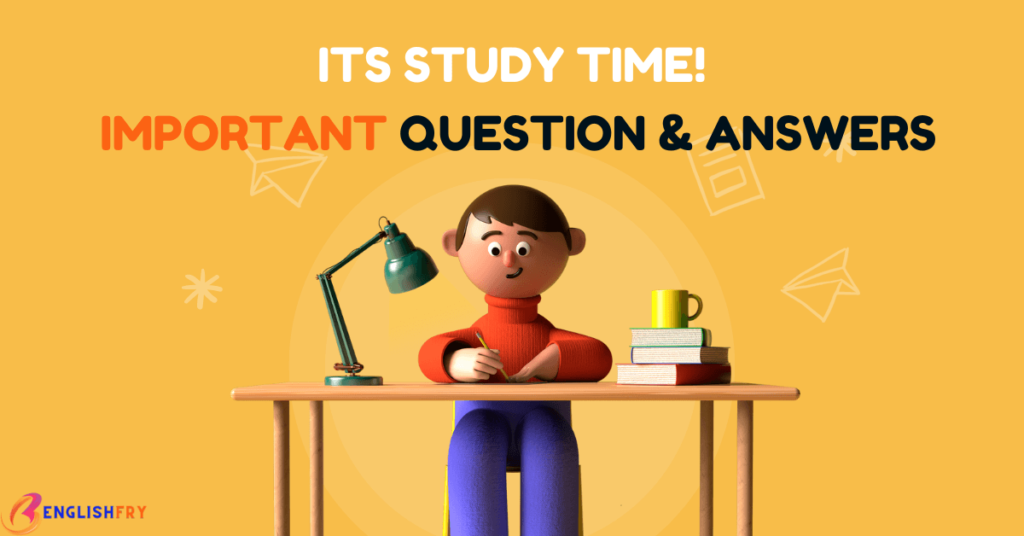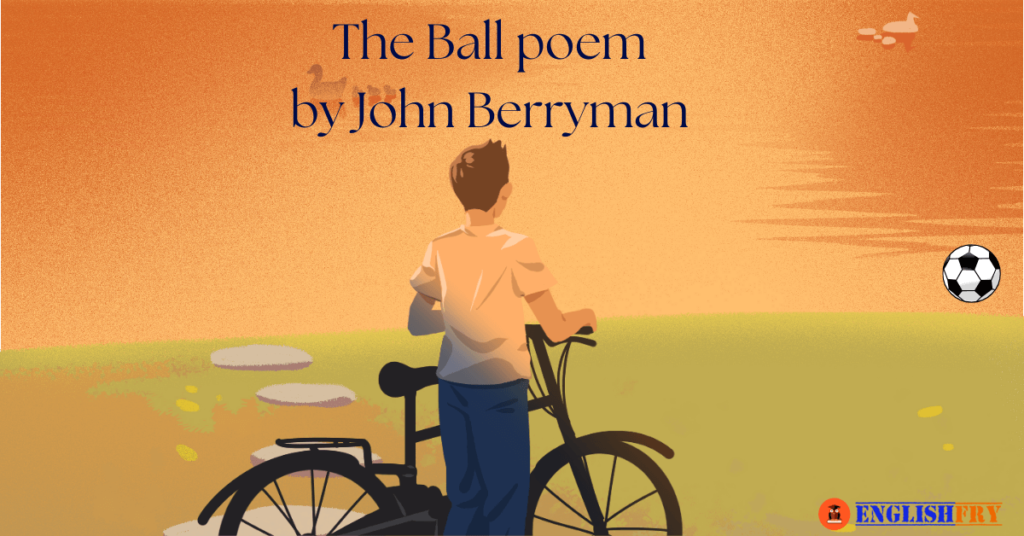The second poem in Chapter 3 of CBSE Class 10 English First Flight book is The Ball Poem. It is written by John Berryman. Here, students will find a detailed explanation of The Ball Poem, along with a summary. The explanation will work as short English notes to help understand the poem in a better way. Students can refer to the summary anytime, whenever they want to recall the meaning of the poem. Going through the explanation and summary of the poem will definately help in board exam preparation.Let Us begin our blog on CBSE Class 10 English First Flight The Ball Poem Summary and Notes
Table of Contents
ToggleAbout the Poet John Berryman

Considered one of the twentieth century’s best American poets, John Berryman turned into born John Allyn Smith, Jr., son of John Allyn and Martha Shaver Smith on October 25, 1914, in McAlester, Oklahoma. In 1921 the family moved to Anadarko, wherein Smith, Sr., served as a bank officer and later as a kingdom game and fish warden. Young John Smith attended public college there and personal school in Chickasha.
In 1925 the circle of relatives moved to Florida. After his father’s suicide in 1926 following a failed business deal, his mom quickly married once more and moved the own family to New York City. John Smith, Jr.’s name became legally changed in 1936 to mirror his mother’s marriage to John Angus Berryman.
After attending college in Connecticut, Smith/Berryman enrolled in Columbia University in 1932, and he studied with critic and poet Mark Van Doren. Much of Berryman’s paintings seems to reflect his warfare to solve issues related to his father’s death, to finish his very own excessive self-examination, and to work out his private relationships.
Berryman commenced his literary career in university whilst he posted a poem in The Nation. After graduating with an English diploma from Columbia in 1936, he spent two years at Clare College of Cambridge University in England, and there he met and communed with outstanding poets, together with William Butler Yeats and Dylan Thomas.
Influenced strongly by using his buddy the poet Robert Lowell, he published his first book of verse, The Dispossessed, in 1948. A sonnet series written inside the 1940s turned into posted in 1967 as Berryman’s Sonnets. He taught in severa universities, briefly at Harvard, and for ten years at Princeton inside the 1940s.
After the 1956 publication of his widely acclaimed poem “Homage to Mistress Bradstreet,” he located coaching positions at the colleges of Iowa and Minnesota, final there for the rest of his profession.
Among his published works are seventy seven Dream Songs (1964), winner of the 1965 Pulitzer Prize for Poetry. His Toy, His Dream, His Rest (1968) won the 1969 National Book Award and the Bollingen Prize (Yale University) for poetry. Berryman changed into elected an Academy of American Poets fellow in 1966 and become a chancellor from 1968.
He also wrote an vital essential biography of novelist Stephen Crane (1950) and a big body of literary complaint on the works of Shakespeare, Walt Whitman, Theodore Dreiser, and Saul Bellow. John Berryman took his own life on January 7, 1972, in Minneapolis.
The Ball Poem Summary Stanza wise
CBSE Class 10 English First Flight The Ball Poem Summary and Notes
Stanza-1
What is the boy now, who has lost his ball, What, what is he to do? I saw it go
Merrily bouncing, down the street, and then Merrily over-there it is in the water!
No use to say “O there are other balls’:
Explanation: The poem is about a little boy. For the first time in his young life, he is learning what it is like to experience grief at the loss of a much loved possession, that is, his ball. The ball is here symbolic of the sweet memories of his childhood. The boy loses his ball and watches it bouncing down the street into the water. To us, the loss of a ball is of minor consequence but to the little boy, it was a valued possession. The poet here, deters himself from saying that there are other balls because the boy wants the same ball. The ball had been with him for a long time and it was linked to the memories of the days when he played with it. The boy’s ball personifies his young days and happy innocence.
Stanza-2
An ultimate shaking grief fixes the boy
As he stands rigid, trembling, staring down
All his young days into the harbour where
His ball went. I would not intrude on him;
A dime, another ball, is worthless.
Explanation: When the young boy loses his ball, it bounces away and lands in the harbour. The boy is very much troubled at the loss of his ball and plunges into grief. He stands stiff and trembling while staring at his ball. He is upset as he looks into the gloomy water because he cannot find the ball. The boy is deeply affected by the loss of his ball because it has been with him for a long time. When the ball bounces into the water all his memories of the childhood days flashes in front of him. This leads to a realisation that those poet doesn’t offer him money to buy another ball because that would be worthless.
Stanza-3
……….Now
He senses first responsibility
In a world of possessions. People will take
Balls, balls will be lost always, little boy.
And no one buys a ball back. Money is external.
Explanation: The boy is upset when he looks into the gloomy water because he cannot find the ball. This is when he gets his first sense of responsibility. The poet suggests that from the loss of the ball, the boy is learning what it means to lose something in a world of possessions where he will lose things, will buy some more to replace the ones lost, but would never be able to buy back the thing that he had lost. In this poem, the boy’s ball personifies his young days and happy innocense, that Money is external as it cannot buy memories, nor can it replace the things that we love, the things that really matter.
Stanza-4
He is learning, well behind his desperate eyes,
This epistemology of loss, how to stand up
Knowing what every man must one day know
And most know many days, how to stand up.
Explanation: The poet suggests that from the loss of the ball the boy is learning how to stand up in a world of possessions. The boy is learning what it means to lose something. The poet says that knowing that every man has to stand up after such losses, the boy too will learn how to stand up and leave the losses behind as he would have understood the true meaning and nature of loss.
Conclusion of The Ball Poem
This poem successfully describes how we may feel to lose something that we love and grow up eventually without it.
Central idea of The Ball Poem
The poet john Berryman in this Poem describes the grief of a boy over the loss of his boll. With that loss he senses his first obligation in a materialistic international. The poet suggested that the people whom we adore , and our material possessions will no longer be with us all the time. One has to apprehend the character of loss and learn that loss. The child has to learn that loss is part of ordinary lifestyles and nevertheless life goes on.
The Ball Poem Question and Answers

Question1: What has the boy lost?
Answer: The boy has lost his ball.
Question2: How does the ball go down the street?
Answer: The ball goes down the street bouncing merrily.
Question3: Where does the ball end up?
Answer: The ball ends up in the water.
Question4: Why is it not helpful to say, “There are other balls”?
Answer: It is not helpful because the loss of his specific ball deeply saddens the boy.
Question5: How does the boy feel after losing his ball?
Answer: The boy feels a profound grief, which makes him rigid, trembling, and unable to look away from where his ball went.
Question6: What does the boy realize about the world of possessions?
Answer: The boy realizes that possessions can be lost, and others may take them away.
Question7: Will someone buy the boy a new ball?
Answer: No, no one will buy the boy a new ball.
Question8: What does the boy learn from the experience of losing his ball?
Answer: The boy learns the nature of loss and the responsibility of owning possessions.
Question9: What does the word “epistemology” mean in the context of the poem?
Answer: In this context, “epistemology” refers to the understanding or knowledge gained from experiencing loss.
Question10: What does the poet suggest about the experience of loss?
Answer: The poet suggests that loss is a universal experience, and everyone must learn how to cope with it.
Question11: What is the central theme of the poem “The Ball Poem”?
Answer: The central theme of the poem “The Ball Poem” revolves around the concept of loss and its impact on individuals.
Question12: How does the loss of the ball impact the boy in the poem?
Answer: The loss of the ball deeply affects the boy in the poem. It fills him with grief, making him rigid, trembling, and fixated on the spot where his ball went. It introduces him to the responsibility and vulnerability associated with owning possessions.
Question13: What does the poem suggest about the nature of possessions and their value?
Answer: The poem suggests that possessions, represented by the ball, are transient and can be easily lost or taken away. It implies that possessions hold emotional value beyond their material worth.
Question14: How does the poet explore the concept of loss in the poem?
Answer: The poet explores the concept of loss by depicting the boy’s intense emotional reaction to losing his ball. The poem captures his immediate grief, as well as his realization of the universal nature of loss and the need to come to terms with it.
Question15: What emotions does the poem evoke regarding the loss of the ball?
Answer: The poem evokes grief, sadness, and a sense of irreplaceable loss regarding the boy’s ball. It conveys the profound impact of losing something cherished.
Question16: What is the significance of the ball being in the water?
Answer: The significance of the ball being in the water suggests that the ball is irretrievable, emphasizing the permanent nature of loss and the boy’s inability to regain what he has lost.
Question17: How does the boy’s perception of the world change after losing his ball?
Answer: After losing his ball, the boy’s perception of the world shifts. He becomes aware of the fragility of possessions and the inevitability of loss. He learns the importance of taking responsibility and understanding the transient nature of material belongings.
Question18: What does the phrase “epistemology of loss” refer to in the poem?
Answer: The phrase “epistemology of loss” refers to the understanding or knowledge gained from experiencing loss. It signifies the boy’s growing awareness of the emotional and philosophical aspects associated with losing something valuable.
Question19: How does the poem convey the idea that loss is a universal experience?
Answer: The poem conveys the idea that loss is a universal experience by portraying it as an inevitable part of life. The boy’s loss of his ball serves as a metaphor for the broader human experience of losing cherished things.
Question20: What message or life lesson does the poet convey through the boy’s experience with the lost ball?
Answer: Through the boy’s experience with the lost ball, the poet conveys the message that loss is an integral part of life. It teaches the boy, and readers, the importance of accepting and dealing with loss, and the need to find resilience and understanding amidst the inevitable losses we encounter.
The Ball Poem mcq with answers

- What is the central theme of the poem “The Ball Poem”?
- A) The joy of playing with a ball
- B) The loss of innocence and the understanding of loss
- C) The importance of buying expensive toys
- D) The excitement of playing with friends
Correct Answer: B
- Why is the boy in the poem so upset about losing his ball?
- A) The ball was very expensive
- B) He can’t find another ball
- C) He doesn’t like playing with balls
- D) He is learning a valuable lesson about loss
Correct Answer: D
- What does the poet suggest the boy has to learn from the experience of losing his ball?
- A) How to find a new ball
- B) The importance of money
- C) The epistemology of loss and responsibility
- D) The joy of watching balls bounce
Correct Answer: C
- Who is the speaker in the poem?
- A) The boy who lost the ball
- B) The poet
- C) The boy’s friend
- D) A passerby
Correct Answer: B
- What does the boy see the ball doing before it ends up in the water?
- A) Rolling down the hill
- B) Bouncing down the street
- C) Floating in the air
- D) Sinking into the ground
Correct Answer: B
- Why does the poet say, “No use to say ‘O there are other balls’”?
- A) Because the boy doesn’t want another ball
- B) Because there are no other balls available
- C) Because the boy is inconsolable
- D) Because the boy should learn to live without a ball
Correct Answer: C
- What is the significance of the ball going into the water?
- A) The boy can fish it out later
- B) The ball is lost forever
- C) It symbolizes the boy’s happiness
- D) It symbolizes the boy’s skill at swimming
Correct Answer: B
- What does the poet mean by “An ultimate shaking grief”?
- A) The boy’s happiness at losing the ball
- B) The boy’s anger at the ball
- C) The boy’s profound sorrow and distress
- D) The boy’s indifference to the ball
Correct Answer: C
- What does the phrase “the epistemology of loss” refer to in the poem?
- A) The science of buying balls
- B) The boy’s love for the ball
- C) The boy’s learning about the nature of loss
- D) The boy’s happiness
Correct Answer: C
- What is the significance of the phrase “Knowing what every man must one day know”?
- A) The boy is wiser than other men
- B) The boy has learned to swim
- C) The boy has learned the value of money
- D) The boy is learning about loss, just like everyone else
Correct Answer: D
- Who is the author of the poem “The Ball Poem”?
- A) William Wordsworth
- B) John Berryman
- C) Robert Frost
- D) Emily Dickinson
Correct Answer: B
- What emotion does the boy experience when he sees his ball in the water?
- A) Happiness
- B) Anger
- C) Grief
- D) Excitement
Correct Answer: C
- What does the phrase “Merrily bouncing” describe in the poem?
- A) The boy’s sadness
- B) The ball’s joyful movement
- C) The boy’s laughter
- D) The ball’s stillness
Correct Answer: B
- Why does the poet say, “A dime, another ball, is worthless”?
- A) The boy can buy another ball with a dime
- B) The boy should have saved money
- C) Material possessions are not valuable
- D) The boy should have taken better care of his ball
Correct Answer: C
- What is the boy learning “well behind his desperate eyes”?
- A) How to find a new ball
- B) The epistemology of loss
- C) How to swim in the water
- D) How to play with other children
Correct Answer: B
- What does the phrase “A dime, another ball, is worthless” suggest about the boy’s understanding of the situation?
- A) He realizes the value of money
- B) He is indifferent to losing the ball
- C) He is deeply affected by the loss
- D) He can easily buy another ball
Correct Answer: B
- What does the poet mean by “Money is external” in the poem?
- A) Money is not important
- B) Money is inside the boy’s pocket
- C) Money is hard to find
- D) Money cannot bring back the lost ball
Correct Answer: D
- What is the main message the poet conveys through this poem?
- A) The joy of playing with a ball
- B) The importance of buying expensive toys
- C) The inevitability of loss and the lessons it teaches
- D) The futility of crying over a lost ball
Correct Answer: C
- What literary device is used in the line, “Merrily bouncing, down the street”?
- A) Alliteration
- B) Simile
- C) Metaphor
- D) Personification
Correct Answer: D) Personification
- What does the boy “staring down all his young days into the harbour” symbolize?
- A) His love for the sea
- B) His attachment to the ball
- C) His fear of water
- D) His understanding of loss
Correct Answer: D
- Who or what does the boy’s ball represent in the poem?
- A) His favorite toy
- B) His friends
- C) His childhood innocence
- D) His family
Correct Answer: C
- What is the boy’s initial reaction to losing the ball?
- A) He laughs
- B) He looks for another ball
- C) He cries
- D) He doesn’t react
Correct Answer: C
- What does the phrase “People will take / Balls, balls will be lost always, little boy” suggest?
- A) People steal balls from little boys
- B) Loss is a part of life, and it happens to everyone
- C) The boy is to blame for losing the ball
- D) The boy’s friends took his ball
Correct Answer: B
- Which of the following best describes the tone of the poem?
- A) Joyful
- B) Sad and reflective
- C) Angry
- D) Excited
Correct Answer: B
Certainly, here are the remaining MCQs based on the poem “The Ball Poem”:
- What does the boy’s realization about “responsibility” signify in the poem?
- A) The boy has to take care of his family
- B) The boy is now responsible for buying a new ball
- C) The boy understands that he must accept the consequences of losing his ball
- D) The boy is responsible for his own actions
Correct Answer: C
- Which literary device is used in the line, “I saw it go”?
- A) Simile
- B) Metaphor
- C) Alliteration
- D) Personification
Correct Answer: B) Metaphor
- What does the phrase “how to stand up” symbolize in the poem?
- A) Learning to walk
- B) The boy’s physical ability
- C) The boy’s emotional and moral strength
- D) The boy’s indifference to the loss
Correct Answer: C
- What does the poet mean when he says, “And no one buys a ball back”?
- A) Balls are too expensive
- B) Once a ball is lost, it cannot be replaced
- C) People are unwilling to help the boy
- D) The boy doesn’t want to buy a new ball
Correct Answer: B
- What lesson does the boy learn from losing his ball?
- A) The importance of buying more balls
- B) The need to avoid playing with balls near water
- C) The significance of money
- D) The epistemology of loss and responsibility
Correct Answer: D
- Which line from the poem best reflects the poem’s central theme of loss and the lessons it teaches?
- A) “A dime, another ball, is worthless.”
- B) “An ultimate shaking grief fixes the boy.”
- C) “Merrily bouncing, down the street.”
- D) “People will take / Balls, balls will be lost always, little boy.”
Correct Answer: B
Founder of Englishfry.com, a captivating and knowledge-driven blog & Founder of Android app/website Studyfunnel.com, an online Mock Test Series Portal. With a wealth of experience spanning over 16+ years, he has excelled as an Ex-Asst.Professor, Teacher, Amazon published author, Website Developer, Graphic Designer,Blogger,Poet, and Creative academic content writer publisher of 4 academic books available Online on Amazon & Flipkart. His tryst in Literature helped him realize his love for writing and telling stories. A tech-savvy language nerd by day and, a passionate writer by night, he now translates his experiences into tales of wisdom served with a side of humor.His widely recognized profound insights ,captivating writing style of weaving words make him contribute to prestigious publications and a sought-after authority in the field that transport readers to extraordinary worlds.








